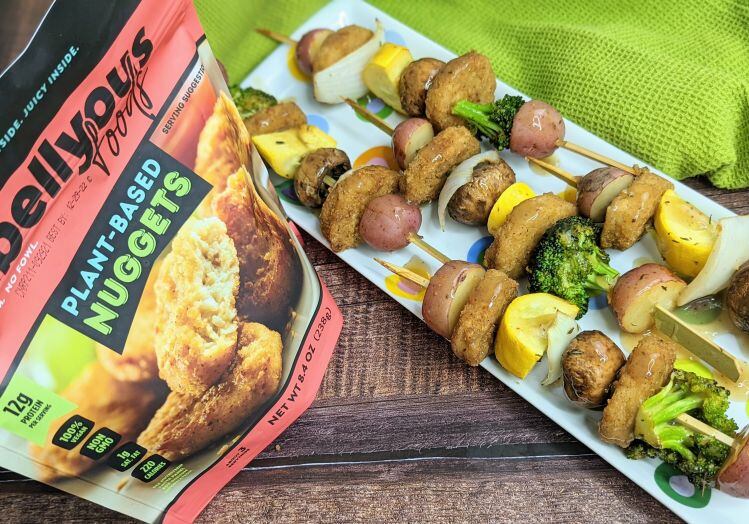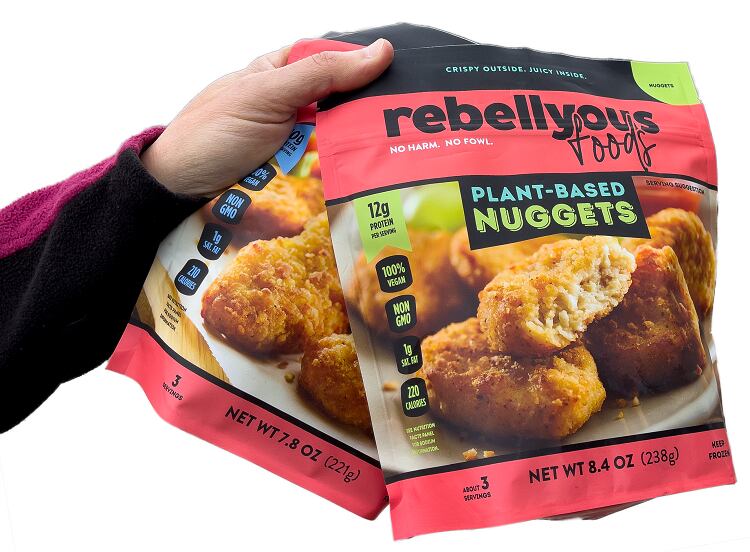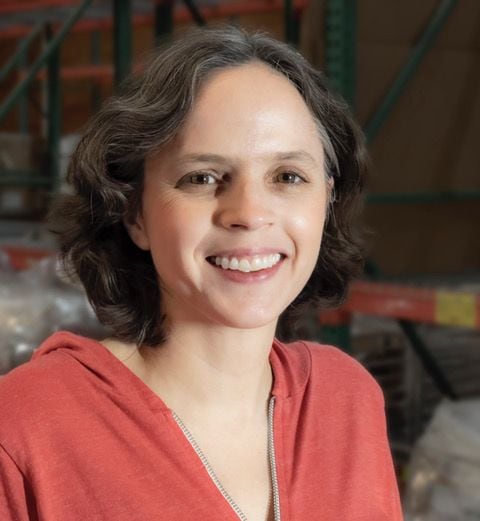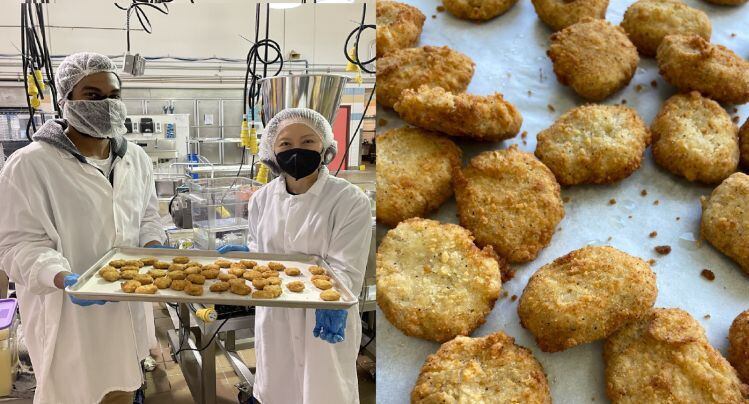Is it price? Taste and texture? Questions about protein content, quality, or ‘naturalness’? Cultural barriers (dairy milk’s been in decline for years, but Americans still love meat)? A fundamental lack of interest from many meat-eaters?
Clearly, achieving price parity alone isn’t enough; meat alternatives must have strong consumer appeal to gain share, notes Rebellyous Foods founder Christie Lagally.
But two of the biggest hurdles, she says, are price and quality-at-scale, and Seattle-based Rebellyous Foods is tackling both head on with technology Lagally claims can transform the unit economics of plant-based nuggets by slashing labor costs and dramatically increasing yields.
How are most plant-based nuggets currently made?
So how does it work?
Right now, says Lagally, most firms making plant-based chicken nuggets are deploying a pretty labor-intensive ‘mix and form’ batch process that involves three basic steps: hydrating texturized soy, pea, or wheat protein; mixing together a combination of oils, waters, starches, and other ingredients; and then combining the hydrated TVP and the gloopy binding mixture to make a dough. This is then formed into nuggets, which are breaded and fried.
While elements of this can be mechanized (you don’t have to stir TVP by hand as you hydrate it), it’s not very scalable, because there is a limit to the batch size, claims Lagally, a former Boeing engineer who has spent three years developing an alternative approach.
The ‘plant-based meat paradox’
Take the hydration part, she says: “The more the TVP absorbs water, the heavier it gets, and the more it weighs down on itself and pushes water out the bottom, so there's actually a physical limit to how big a batch size of plant-based meat can be produced in it. I call it the plant-based meat paradox, because you end up destroying your own product by the act of making it.”
Increasing the efficiency of the second step (creating an emulsion of water, oils, starches and other ingredients that will bind the nuggets together) is also easier said than done in a batch system, she said. Mechanizing the mixing process, for example, creates heat, so firms either do it manually, or add ice or freeze the room to keep temperatures down, which adds expense, and is tough on workers.
The third step, meanwhile (mixing the hydrated TVP and the binder) is time-consuming and tough, because the dough – unlike conventional mincemeat - is very viscous (it sticks to everything), says Lagally, while the same batch-limiting factors also apply.
“Sometimes people have to mix this for a good half hour so the mix is evening distributed, and if they mix it for that long, it will start to heat up a lot and the heating up will reduce the quality of the flavoring and the emulsion, so again the way it’s made limits the batch size, and the quality. You also end up losing a lot of waste in the process [a percentage of each batch remains stuck to the size of the mixer].”
In short, she says, “in the plant-based meat space, we have more processing steps, more intensive labor steps and longer sanitation cycles.”

From a batch to a continuous process
Lagally’s Mock 1S chilled automated system, by contrast (which is deployed at its facility in Seattle where Rebellyous produces 20% of its output; the rest is made by a co-packer using the standard mix and form approach outlined above), enables the production of plant-based meat on a continuous basis, she explained.
“This means you don't have that problem with more hydrated protein actually decreasing the quality of other hydrated protein. And you don't have that problem with the salad dressing material [the emulsion mixture] working unevenly so some parts [of the final dough] are fully emulsified, but not others.
“Plus, as it’s a continuous process, you don’t have the problem where mixing the final dough makes it hotter and hotter because you're not mixing the same material over and over again [in one big batch].”
Mock 2 – the next generation of the machine – which Lagally aims to deploy in the middle of 2023 – will enable Rebellyous to reach cost parity with chicken nuggets, she said. “The Mock 1S can so around 100lbs/hour; the Mock 2 can do 2,000lbs an hour.”
Gross margins from 15-25% to 51%... with prices at parity with conventional chicken nuggets
Where other plant-based meat companies are only achieving gross margins of 15-25% even at scale, she claims, “What the Mock 2 will allow is closer to a 51% margin on products that are at price parity with regular chicken.
"It’s addressing cost, but also quality and consistency, [which, she claims, companies that are using a batch process are losing at scale].”

According to Rebellyous Foods, its next-generation Mock 2 continuous production system will enable to company to achieve:
- 90% reduction in production workforce costs through automation
- 10% reduction in energy costs by eliminating the need for a chilled environment
- 1/3 of the footprint on the production floor vs. current production methods
- 1/4 reduction in sanitation staff, reducing labor costs further
- 90% reduction in material waste through continuous production
- 100% elimination of re-work for work-in-progress
Image credit: Rebellyous Foods
Rapid growth

Rebellyous Foods, which was founded in late 2017 (as Seattle Food Tech), is performing well in retail and foodservice markets, said Lagally, who is now working with 50 school districts in the National School Lunch Program and hopes to be working with 75-100 by the year end.
“April was our biggest month yet, and that would be about $2.2m annualized, and we're growing considerably month-over-month.
“We will be using the Mock 2to dramatically expand on that school lunch market, while from the retail perspective we also hope to be able to offer consumers a much better price on restaurant quality plant-based meat,” added Lagally, who has raised around $20m to date, and is currently raising more capital to support the deployment of the Mock 2.
‘Consumers only have so much tolerance for paying three times the price of animal meat for plant-based meat’
So what’s her take on the current debate over the commercial potential of plant-based meat?
“First and foremost,” she says, “consumers only have so much tolerance for paying three times the price of animal meat for plant-based meat. Second, there are a lot of bench scale products that are just fantastic, but when you make plant-based meat at scale, the quality goes down. We’re solving both of those problems.”




